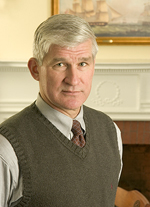Andrew Bacevich on the new American militarism
International relations professor will discuss today how war seduced America

Andrew Bacevich is the author of the recent book The New American Militarism: How Americans Are Seduced by War. The CAS professor of international relations will examine the trends that brought about a revival of the prestige of the U.S. military in a discussion on Tuesday, October 18, at 4 p.m. at the African-American Studies Center Library, 138 Mountfort St., Brookline, on South Campus.
Bacevich is a former U.S. Army colonel and a former director of BU’s Center for International Relations. His previous books include American Empire: The Realities and Consequences of U.S. Diplomacy (2002) and The Imperial Tense: Problems and Prospects of American Empire (2003).
He spoke with BU Today recently about his book and the upcoming talk, which is free and open to the public.
In your book, you assert that during the past three decades both Democrats and Republicans came to believe in the overwhelming power of our military — that America is preoccupied with military might. Do you think this attitude will change?
Is it possible that Americans will wean themselves from their current infatuation with military power and become once again skeptical of it? Yes, it might happen as we evaluate the consequences of U.S. policy. Are we going to end up thinking that the Iraq war was worth it — or are we going to end up thinking Iraq was a disaster? The notion that our involvement in Iraq was reckless and a mistake — if that interpretation takes hold, then it seems to me that the American people generally, and our leaders more specifically, will probably be somewhat more skeptical about using military power in the future.
On the other hand, if we take the view that this was a necessary war — that it was a war of liberation, one that has made us more secure — in the long run we’re in danger of pursuing policies that, at least in my judgment, are misguided with regard to military power. How we, as a people, digest and make sense of Iraq is going to have a large influence on the way we think about military power in the future.
So the outcome of the war will dictate our foreign policy for years to come?
It depends not only on how the war goes, but on how it’s interpreted and how it’s incorporated into our national story. This part of the story will initially be told by the press, and then historians will take up the cudgels and fight with one another over the meaning of the war. That kind of argument tends to yield a certain consensus. For example, as a people, we’re not at odds with one another about the meaning of World War I any longer. There was a time when that was a tremendously contentious issue, but finally an agreement emerged and basically has remained intact for the last 50 years or more. So there will be a big argument in the press and also among historians about the meaning of the Iraq war, and how that argument plays itself out will probably affect not only the way we think about the Iraq war specifically, but how we think about our global military power in general.
What do you think of the opinion that since 9/11 the Bush administration has imposed on us a new set of attitudes about military power — and that this has led to the Iraq war?
The phenomenon that I call ‘the new American militarism’ has been a long time coming, and it doesn’t simply reflect the belief that there is some kind of conspiracy involving the Bush administration. It reflects the way important groups in American society responded to the 1960s and the Vietnam War. Their response focused on rebuilding and in many respects celebrating military power. And that effort succeeded, so that by the time we get to the 1990s, there is this infatuation with power — this great confidence that the American armed services can do just about anything. There is a conviction that we figured out the secrets of high-tech warfare, which can be counted on to achieve a swift and economical victory in almost any circumstances. All of that is getting tested in Iraq. If you have my perspective, the test is not going very well.
You have pointed out that your book isn’t a passivist tract — that military force is sometimes necessary. When should force play a role?
Force is a useful instrument, but also an instrument that’s difficult to control. When you use it, you frequently tend to also bring about consequences other than those you intended. We rightly entered World War II to fight against Germany, and we succeeded in defeating Germany, which was a necessary and good thing. But as one consequence of that, Soviet dominance extended over Eastern Europe, which became part of a Soviet empire for 50 years. That was an unintended consequence of a necessary war, so you should use force with a lively awareness that you may get a lot more than you bargained for, and therefore you should use force only when it’s absolutely necessary.